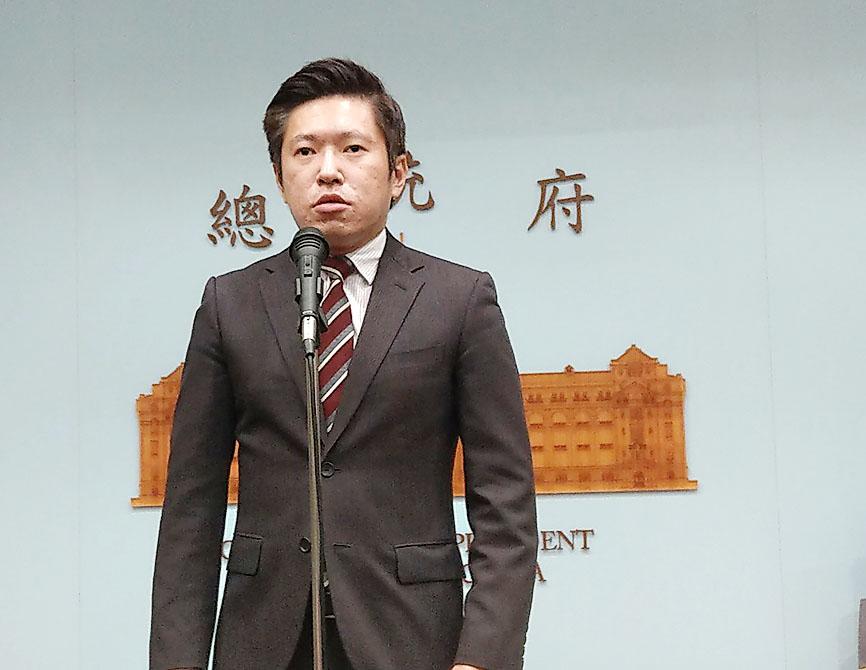The US$2.3 trillion government spending package that US President Donald Trump finally signed on Sunday evening incorporates the Taiwan Assurance Act of 2020, as well as money to support activities under the Global Cooperation and Training Framework initiative launched in 2015.
The government yesterday voiced gratitude for the passage of the act, with Presidential Office spokesman Xavier Chang (張惇涵) saying that Taiwan would continue deepening its partnership with the US and be a force for good in the world.
H.R. 133, or the Consolidated Appropriations Act of 2021, covers the fiscal year that ends on Sept. 30 next year and covers a US$900 billion COVID-19 pandemic relief package, US$1.4 trillion to fund government agencies, and backing for Taiwan’s defense capacity and its participation in international organizations.
The Taiwan Assurance Act supports the deepening of US-Taiwan ties on the basis of the 1979 Taiwan Relations Act (TRA).
It states that the US Congress believes Taiwan is a vital part of the US’ “Free and Open Indo-Pacific Strategy” and as such the government should support Taiwan’s continued pursuit of asymmetric capabilities.
“The US should conduct regular sales and transfers of defense articles to Taiwan in order to enhance its self-defense capabilities, particularly its efforts to develop and integrate asymmetric capabilities, including undersea warfare and air defense capabilities, into its military forces,” the new act states.
In terms of Taiwan’s exclusion from international organizations due to Beijing’s opposition, the US Congress believes such a situation is detrimental to global health, civilian air safety and efforts to counter transnational crime, as well as having a negative impact on Taiwan’s democracy.
The act stresses that it is the policy of the US to advocate for Taiwan’s meaningful participation in the UN, the WHO, the International Civil Aviation Organization, the International Criminal Police Organization and other international bodies, as appropriate.
The US should also advocate for Taiwan’s membership in the Food and Agriculture Organization, the UN Educational, Scientific and Cultural Organization and other international organizations for which statehood is not a requirement for membership, it added.
The “Review of Department of State Taiwan Guidelines” states that the US secretary of state must conduct a review of the department’s guidance that governs relations with Taiwan not later than 180 days after the enactment of the law.
It also said the State Department’s guidance regarding relations with Taiwan should reflect the long-standing, comprehensive and values-based relationship the US shares with Taiwan, and contribute to the peaceful resolution of cross-strait issues.
The Ministry of Foreign Affairs also issued a statement thanking “the US government and Congress for supporting Taiwan-US relations through concrete actions.”
The ministry said the new law includes US$3 million to support activities under the Global Cooperation and Training Framework, which helps bring Taiwan’s expertise in areas such as public health, disaster relief, women’s empowerment and cybersecurity to the global stage.
Meanwhile, in Beijing, Chinese Ministry of Foreign Affairs spokesman Zhao Lijian (趙立堅) said that China was “resolutely opposed” to the Taiwan Assurance Act of 2020 as well as the Tibetan Policy and Support Act of 2020, which was also part of the omnibus bill signed by Trump on Sunday.
The US should not put the parts of the acts which “target China” into effect to avoid harming Sino-US relations, as they were an interference in China’s internal affairs, Zhao told reporters at a regular briefing at the ministry.
The Tibet act states that sanctions should be put on Chinese officials who interfere in the selection of the successor to the exiled Dalai Lama.
Additional reporting by Su Yung-yao and agencies
Source: Taipei Times - 2020/12/29









